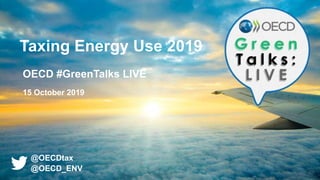
OECD Green Talks LIVE - Taxing Energy Use 2019
- 1. Taxing Energy Use 2019 OECD #GreenTalks LIVE 15 October 2019 @OECDtax @OECD_ENV
- 2. Climate action is urgent Keeping climate change at bay in line with the goals of the Paris Agreement will require deep cuts in emissions. Public pressure is mounting for action on climate change. In the absence of decisive action, extreme weather events will become more frequent and severe, and rising sea levels will endanger coastal cities and entire island states. Yet: energy-related CO2 emissions reached an all-time high in 2018. 2
- 3. What contribution can energy and carbon taxes make in curbing climate change? 3 Other goals of tax and fiscal policy: Revenue, equity, affordability, competitiveness. Other environmental challenges: Air pollution, etc.
- 4. Main results: Taxes are nowhere near their full potential Taxes on polluting fuels remain too low to reduce the risks and impacts of climate change and air pollution Across 44 OECD and G20 economies, 70% of energy-related CO2 emissions are not taxed at all Energy tax systems provide too little incentive to move to cleaner energy Policy reforms can improve environment and climate outcomes and boost the performance of the fiscal system to promote equity, well-being, competitiveness, and efficient tax policy 4
- 5. 5 Taxing fuels is not the only way to price carbon Jurisdictions can use taxes to price carbon, or they can introduce emissions trading systems (e.g., EU ETS, California & Quebec,…). Broadening the scope to emissions trading systems does not change the overall conclusion Related policy issue: Fossil fuel subsidies
- 6. First released in 2013 Snapshot of where OECD countries stand in deploying energy and carbon taxes Extension of country coverage in 2015 Inclusion of 7 OECD Partner Economies Tax rates for 2012 First Update in 2018 Update of tax rates to 2015. Analysis of change from 2012 to 2015 Second Update in 2019 Tax rates for 2018 Inclusion of international aviation and maritime transport Now covers 44 OECD and G20 countries Taxing Energy Use: What’s new? 6
- 7. Scope of Taxing Energy Use 2019 1. Compares tax-based carbon price signals against a low-end carbon price benchmark of EUR 30/tCO2, taking a broad economic approach 2. Analyses tax-based energy price signals in EUR/GJ across all forms of energy use, including clean energy sources Breaks down tax rates and tax base by Country Sector, and Energy category 7
- 8. Overall, taxes are not being used to provide meaningful carbon price signals 8 Average* fuel excise per tCO2 in 2018 Average* explicit carbon tax per tCO2 in 2018 Average* effective carbon tax per tCO2 in 2018 Coal and other solid fossil fuels 0.61 0.13 0.73 Fuel oil 3.50 0.46 3.96 Diesel 70.65 3.11 73.76 Kerosene 4.27 0.34 4.61 Gasoline 84.34 1.50 85.83 LPG 10.23 0.89 11.12 Natural gas 4.08 1.19 5.26 * Emission-weighted average across all 44 countries and int. aviation & maritime
- 9. 9 Outside road transport, the bulk of carbon emissions are completely unpriced
- 10. Using taxes for climate action raises revenues – unlike most other climate policy instruments 10 Revenue estimate based on back-of-the-envelope calculation.
- 11. Explicit carbon taxes do not cover all emissions 11
- 12. What does a carbon price signal of EUR 30/tCO2 look like in practice? 12 Energy category Low-end carbon benchmark (EUR 30 per tonne of CO2) Coal and other solid fossil fuels 6.24 eurocent per kilogramme Fuel oil 8.94 eurocent per litre Diesel 7.99 eurocent per litre Kerosene 7.58 eurocent per litre Gasoline 6.86 eurocent per litre LPG 4.75 eurocent per litre Natural gas 5.13 eurocent per cubic metre
- 13. Many countries do not only tax fuels, but also tax electricity, regardless of how it is generated 13
- 14. Key takeaways 1. Strengthening carbon prices will encourage citizens and businesses to take the climate costs of their actions into account and make cleaner investment and consumption choices. 2. Increasing carbon prices first where they are currently lowest makes sense (coal, international aviation and shipping, etc.). 3. In some countries even revenue-neutral electricity tax reform could strengthen incentives to reduce emissions. 14
- 15. TEU 2019 – Green Talk: Outline 15 Q&A
- 16. Would you like to know more? 16 1. Report: Taxing Energy Use 2019, includes country tax profiles. 2. Online country notes: Discuss how energy taxes apply across sectors in additional detail. Access the publication: http://oe.cd/TEU2019
- 17. Related ongoing OECD work 17 Access the publication: http://oe.cd/climate-wellbeing
- 18. Green Talks LIVE Up next… 14 Nov - Pharmaceutical Residues in Freshwater: Hazards and Policy Responses 22 Nov - Scaling up climate-compatible infrastructure - Insights from national development banks in Brazil and South Africa 10 Dec - Aligning Policies in the Land-use Nexus For more information: http://oe.cd/GreenTalks 18 Thank you for joining us #GreenTalks @OECD_ENV @OECDtax
